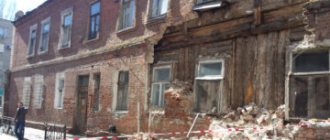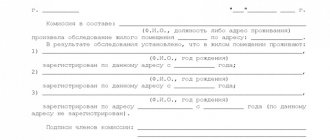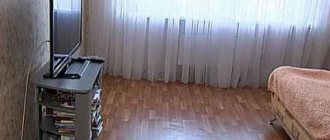Is it possible to recognize a private house as unsafe?
Information on recognizing premises as residential premises, residential premises unsuitable for habitation and an apartment building as unsafe and subject to demolition or reconstruction In accordance with Articles 15 and 32 of the Housing Code of the Russian Federation, the Government of the Russian Federation, by its resolution of January 28, 2006 No. 47, approved the Regulations on recognizing premises as residential premises, residential premises unsuitable for living and an apartment building in disrepair and subject to demolition or reconstruction.
Every year in our huge country there are fires, floods, and in some areas even earthquakes, the consequences of which are sometimes devastating, leaving a huge number of families without a roof over their heads. In addition, the dishonest attitude of the residents themselves towards their houses, the negligent attitude of management companies in the major repairs of houses under their jurisdiction and the elementary dilapidated state of many old buildings force the population to apply for recognition of such residential premises as unsuitable for permanent residence.
How to recognize a private house as unsafe
You probably meant that the land is not privatized. And a private house is your grandmother’s property and is now yours if you inherited it. But your property is your problem and no one is obligated to move you anywhere. The only chance for you is to get demolished. Don’t compare yourself to the residents of high-rise buildings; this is a completely different story. Lone wolf Sage (17752) 5 years ago The government approved a provision according to which the premises are recognized as residential or unfit for habitation, and an apartment building is considered unsafe and subject to demolition.
In addition, the house, which is recognized as unsafe, does not meet sanitary and epidemiological standards and hygienic requirements. For example, in such a living space there may be an increased content in the air of harmful impurities and substances for human life and health. If the background radiation in a building is increased, noise, vibration and electromagnetic fields are increased. A house is also considered unsafe if there are violations in the foundation structure, that is, it is very deformed, which poses a threat to life.
How to recognize a private house as unsafe
- toxicological examination shows the presence of harmful substances above the established level;
- humidity in the house exceeds 60%;
- there is damage to the supporting structure of the building;
- there are no windows in the house;
- the presence of serious damage after an accident, fire and other disasters;
- the location of a residential property in a place where a man-made disaster will soon occur;
- the air temperature does not rise above 18 degrees and remains stable;
- the object is located below ground level (basements and ground floors);
- the house is located next to a landfill, with a highway where the noise level is exceeded, and so on;
- no utilities, etc.
If everything is clear with the house (instead, an apartment will be issued out of turn), then the question arises with the land. Legislation solved this problem in this way: the state, represented by the municipal body, buys the land from the owner. If this option is not suitable for the owner of the plot for some reason, for example, because of the price, then the municipality will issue a plot of appropriate size in another area.
We recommend reading: What is LGBT citizenship?
How to recognize a residential building as unsafe and subject to demolition
The emergency condition of load-bearing structures is a condition in which entire structures or their components, due to natural wear and tear and external influences, have serious deformations and damage , have lost their design strength and, without strengthening measures, can cause an emergency condition of a residential premises or an entire building and are an immediate danger for the people living in it.
- Copies of documents indicating ownership of residential premises, the right to which is not registered in the Unified State Register of Rights to Real Estate and Transactions with It;
- Copies of technical passport;
- Floor plans provided by BTI;
- Documents for the last 3 years indicating general inspections of the residential premises and repair work carried out;
- Conclusion of the sanitary-epidemiological service;
- Conclusion of the fire service;
- Applications, letters, complaints from residents about living conditions, if any;
- Conclusion of the design and survey service on the technical condition of the building. Such a service must have a license to carry out this type of activity;
- Other documents, if necessary.
Is it possible to recognize a private house as unsafe?
It is replaced by the definition of “housing unfit for habitation.” Agree that in the second case, the rules for demolishing a house look very vague. Considering that when a house is demolished, residents are required to provide equivalent housing, officials are reluctant to declare residential buildings uninhabitable.
The refusal was motivated by the fact that the created interdepartmental commission evaluates residential premises (for suitability) located only in apartment buildings. The interdepartmental commission is not empowered to evaluate private residential buildings. Is such a refusal legal? According to Article 57 of the Housing Code of the Russian Federation.
Please tell me whether it is possible to recognize a one-apartment private house as unsafe, dilapidated
Based on the submitted application, a commission must be created within thirty days to inspect the technical condition of the house. This commission should include representatives of various departments: a representative of local government, representatives of sanitary and epidemiological authorities, fire service workers, environmentalists, representatives of consumer protection authorities, architecture and urban planning authorities, and, if necessary, qualified experts from design and survey institutions. In addition, the owners of residential premises are involved in the work of the commission with the right of an advisory vote.
The commission sends one copy of the order and the commission’s conclusion to the applicant within five days. If a house is recognized as unsafe and subject to demolition, rental and rental agreements for residential premises are terminated in accordance with the law. Based on the conclusion received, the relevant authority makes a decision and issues an order indicating the time frame for the evacuation of the residents of the house if the housing is recognized as unsafe. It must be remembered that all decisions related to the recognition/non-recognition of housing as unsafe can be appealed in court after an independent technical examination.
General information
In Russia, a program to eliminate dilapidated housing has been operating for quite some time. Despite the fact that it has been in operation for a long time, a small number of residents have been relocated.
Resettlement according to the project works like this:
- A regional program to eliminate unsuitable housing is being formed;
- Objects are recognized as unsafe and subject to demolition;
- A list of dilapidated and emergency housing is being created;
- A conclusion is made on the reconstruction of the specified house or its removal;
- Before demolition, an equivalent living space is found.
Typically, housing is selected in the same area where people from the house that is being demolished previously lived. The owner of a residential property has the right to write a statement of desire to move to another area.
Any citizen has access to information about whether his house is classified as unsafe and unfit for habitation - special websites have been created for this with a search form by address. Instead of housing, it is possible to provide him with any monetary compensation based on the size of the living space.
It is important to pay attention to the fact that relocation in accordance with the civil code cannot be regarded as a way to improve living conditions or increase living space. When searching for new housing, the area of the previous housing and its condition are taken into account.
The provision applies to all cases, even when a person owned residential premises less than the accounting norm. A person receives the same area that he had.
If the owner wants the new housing to be larger, he will have to pay extra out of his own pocket for the excess meters. There are no strict parameters when choosing the type of housing - the main thing is that it is not in emergency condition.
The procedure for recognizing a house as unsafe: commission
Housing can be considered dilapidated if it is more than sixty-five percent dilapidated. However, after the commission recognizes it as such, there will be no resettlement. You can get a new apartment only when the current housing is considered subject to demolition. Such a decision is made only if the construction of new facilities is planned on the site of a given apartment or private building.
- Carrying out major repairs and reconstruction of an apartment building or other residential premises;
- Recognition of housing as suitable for living in it;
- Recognition of a property as unsafe and subject to demolition;
- Recognition of an apartment or individual private house as dilapidated and uninhabited.
We recommend reading: Sell an Apartment Owned for Up to 3 Years
Refusal to issue an act
If the interdepartmental commission made a decision to refuse to recognize the facility as unsafe, the applicant has the right to appeal such a decision.
Appeal procedure:
- Pre-trial . The applicant files a claim, which is sent to the head of the municipality. The results of the examination and the refusal of the interdepartmental commission are attached to the complaint. The application is reviewed within 30 days.
- Judicial . After receiving a response from the head of local government, it is necessary to prepare a statement of claim to the district or city court. The application must contain a requirement to challenge the act of the local administration and to recognize the house as dangerous for citizens to live in.
The residential building will be declared unsafe by a court decision. If there are grounds, the court will oblige the local government body to include the property on the resettlement list.
How to recognize a house as unsafe - legislative framework
Based on the legislation in force in the country, there are certain criteria that allow a house to be recognized as unsafe. This may include the fact that in this house the presence of any harmful factors was identified that prevented a person from staying there for a long time. Moreover, such factors must necessarily influence the safety of life, as well as human health.
- Application from residents to declare their home unsafe.
- A copy of the technical passport of a specific house. Such a passport should also contain information about the level of wear and tear of a given house and its residual value.
- In addition, the technical organization must also prepare plans and sections of all premises.
- All acts for the last three years that confirm the fact that the owner or any person authorized by the owner has inspected such a specific residential building. Also, such acts indicate information about exactly what and when repair work was carried out during the allotted period of time.
- Conclusion of the sanitary service.
- Conclusion of the fire service.
- Statements, as well as all kinds of complaints from residents of a particular house about the extremely harmful conditions of their permanent residence.
- A conclusion on the general technical condition of a particular house, which must be issued by a specialized organization that has an appropriate license issued by an authorized person. At the same time, such a conclusion must also contain information about the category of unsuitability of the given real estate for long-term residence.
- An act on carrying out all kinds of activities aimed at monitoring compliance with the safety of the existing housing stock.
- All possible other documents that may be required by the commission in order to make its decision on recognizing such real estate as unsafe.
Where to contact
If the owner considers the repair of his residential premises impossible, and its condition is emergency, it is necessary to submit an application to the executive bodies of local government.
Often these are housing or fire inspections, or similar structures. You can address the application to the local administration, and from there it will be forwarded to the place of execution.
After submitting the application, an interdepartmental commission is created, which makes an appropriate decision within a month. The applicant is notified of the results of the work within five days after the decision is made.
The following documents are attached to the application:
- Title documents for the house or their copies certified by a notary;
- Technical passport and floor plan;
- Cadastral number and papers on land privatization;
- Certificate of an independent examination, if any.
If an accident report is received, the owner has three options:
- Receiving material compensation - calculations are based on average market prices per square meter;
- Relocation to a new apartment at municipal expense;
- Purchasing larger housing with an additional payment for excess square meters.
Since land plots are usually small, many owners often choose compensation. In this case, money from the budget is transferred to the owner’s account within a month.
Is it possible to recognize a house as dilapidated or in disrepair?
Article 15 of the Housing Code of the Russian Federation defines a residential premises suitable for permanent residence; in accordance with this definition, an isolated premises is recognized as such, which is real estate and is suitable for permanent residence of citizens (meets established sanitary and technical rules and regulations, other requirements). The legislation does not give us a specific definition of a residential premises unsuitable for habitation, providing only the grounds on which the premises can be recognized as such.
A complete list of grounds for recognizing residential premises as unfit for habitation is presented in the Regulations on recognizing premises as residential premises, residential premises as unsuitable for habitation and an apartment building as unsafe and subject to demolition or reconstruction (approved by Decree of the Government of the Russian Federation of January 28, 2006 N 47), also in accordance with it recognition of private (individual) residential premises as residential premises suitable (unsuitable) for permanent residence of citizens is carried out by an interdepartmental commission created for these purposes.
Building assessment
The legislation is applicable in housing conditions that do not meet sanitary standards, safety regulations, and also threaten health and life. The criteria for assessing accident rates are given in Decree of the Government of the Russian Federation No. 47:
- Dangerous location of the house - an area with a high probability of landslides, avalanches, floods, flooding;
- Man-made danger – being near objects of man-made danger and accidents;
- Communication hazard - placing housing too close to power lines;
- Geological factors - destruction or damage to a house as a result of storms, earthquakes, blizzards, with the impossibility of its restoration;
- Being near highways means exceeding noise standards by more than 55 decibels;
- Hygienic violations – the inability to comply with sanitary and epidemiological standards.
The criteria also include the condition of the foundation and load-bearing elements of the building - if they are worn out and deformed, the housing is considered unsuitable for use.
Emergency building: joy or sadness for residents
Please note that the residents of the resettled house are given exactly equivalent housing. If you lived in a separate apartment, moving to a communal apartment is considered illegal, and you have the right to refuse to move. Responsible tenants do not have the right to choose, so they move to the area where there is free living space. For example, if you lived in the center, you may well be provided with housing on the outskirts.
- complaints from residents about the technical condition of the house, written to the appropriate authorities;
- title documents giving residents the right to dispose of real estate;
- BTI documents, including explication and floor plan of the building. In addition, technical documentation for each apartment will be required;
- conclusions of the sanitary-epidemiological and fire services, giving grounds to consider the house unfit for habitation;
- conclusion of an expert commission confirming the technical condition of the house.
The procedure for recognizing housing as unsafe or unfit for habitation
Housing is recognized as unsafe after inspection and conclusion by members of a special commission convened at the request of residents or responsible government officials. This happens in an administrative (standard) manner or during a court hearing (if there is no agreement that the house can be lived in or, conversely, that the house must be demolished).
Administratively
If the owners believe that the building cannot be repaired, they turn to local authorities. It is the responsibility of the interdepartmental commission to decide whether or not to include a real estate property in the register of emergency housing. It is convened in accordance with Resolution No. 47 no later than 30 days after receipt of the application.
Flooding of the apartment by neighbors. What to do? How to sue?
The responsibilities of the commission include:
- drawing up an inspection report on the building and its individual premises (basement, apartment, room);
- making an opinion on the degree of suitability of the building for habitation.
Members of the commission:
- check the condition of load-bearing and enclosing structures for destruction and serious damage;
- study the slopes and strength of stairs;
- study the condition of the engineering system and its compliance with sanitary requirements;
- inspect external scenes to ensure they provide the necessary thermal insulation;
- make sure that housing is protected from external natural influences (wind, dust, rain, snow).
A tenant living in a dilapidated building may be included in the commission, but he has only an advisory role; such a person does not have the right to vote. If a house is declared uninhabitable, then apartment owners are notified of the upcoming eviction no later than the day after the relevant decision is made.
The homeowner has the right to demand compensation for losses associated with relocation or demand full reimbursement of the cost of the apartment.
Residents who own an apartment under a social tenancy agreement do not have the right to demand compensation; they are given housing of equal size in a new building, where people are being relocated from emergency housing. Reimbursement of the price of the apartment occurs on the basis of Art. 32 of the Housing Code of the Russian Federation and without the possibility of subsequent participation in the program for relocating residents from the old house to the new one.
Example. Citizen Biryukov R.O. demanded compensation for the cost of the apartment from which they plan to move him. The request was granted. After some time, all the residents of the building moved to new apartments, and the old building was demolished. Citizen Biryukov did not receive new housing, since the cost of the square meters that once belonged to him was fully paid.
The commission examines the technical characteristics of the building (technical passport) and requests extracts from the Unified State Register. The final conclusion of the commission members is drawn up in 3 copies. Moreover, if the votes of the commission members are equal, then the deciding vote belongs to the chairman.
Rules for living in an apartment building
If the residents of the house disagree with the decision, they have the right to seek recognition of the house as unfit for habitation in court.
Judicially
You can file an application with the court to appeal a decision made by the interdepartmental commission within 3 months from the date of receipt of information about it (p. 219 CAS RF). To prove the groundlessness and fallacy of the conclusions reached by the commission members, they submit a petition to the court containing a request to conduct a construction examination.
The petition indicates the need to obtain answers from the expert to the following questions:
- about the condition of the building located at a specific address;
- about the possibility of repairing the building, reconstructing it;
- on the economic feasibility of reconstruction or repair work that contributes to the restoration of the building.
If the expert issues a conclusion that neither accommodation nor repairs in the building are possible, then the conclusion made by the interdepartmental commission is declared invalid by the court. The procedure in this case depends on whether the citizen is the owner of the premises or owns it under a social tenancy agreement.








